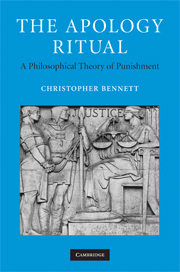3 - Responsibility, reactive attitudes and the right to be punished
Published online by Cambridge University Press: 22 September 2009
Summary
In this chapter, we look at the crucial question of responsibility. The claim that criminal justice is fundamentally different from other state interventions because it is a response to culpability rather than mere harm rests on the assumption that individuals really are culpable for wrongful actions. Culpability, for the retributivist, is a state that in itself calls for hard treatment. This claim that some things that human beings can do call for hard treatment has a pivotal status in the argument between retributivists and non-retributivists. But to what extent, if any, are individuals responsible for what they do? And specifically, do we have free will in the sense that would justify retributive punishment, making it morally necessary to punish those who are culpable? In this chapter I present one of the most comprehensive sceptical arguments against moral responsibility and then consider how we might respond to it. In developing a retributivist response I start with P. F. Strawson's article, ‘Freedom and Resentment’. However, in this chapter I offer a novel constructive interpretation of Strawson's argument that detects in his position the basis for a ‘right to be punished’ strategy. I defend this strategy in this part of the book.
the sceptical argument from luck
We should be clear at the outset about the sense of ‘freedom’ that is at issue in this chapter.
- Type
- Chapter
- Information
- The Apology RitualA Philosophical Theory of Punishment, pp. 47 - 73Publisher: Cambridge University PressPrint publication year: 2008



